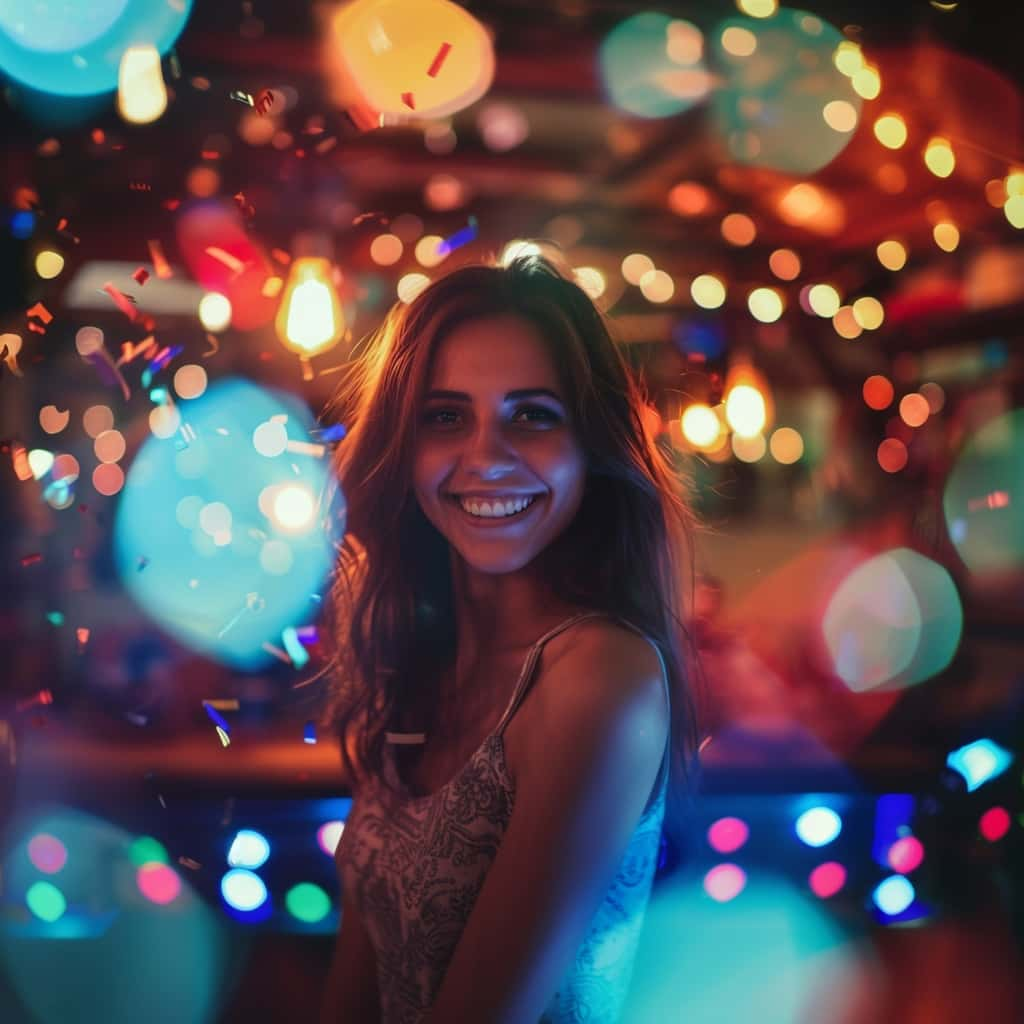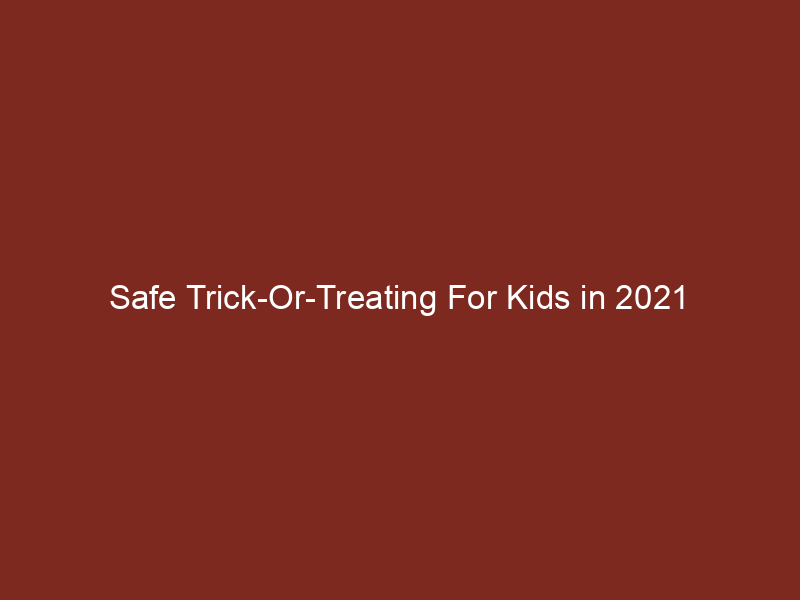Halloween
Does South Africa Celebrate Halloween?
South Africa's subtle adoption of Halloween reveals a fascinating cultural fusion, but what sparks this eerie fascination among the youth?
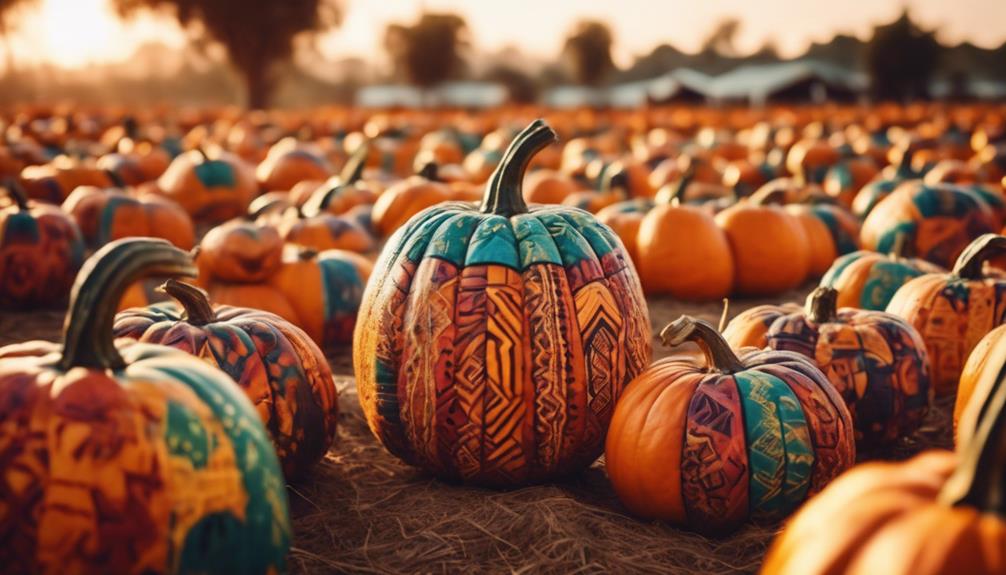
You'll find that South Africa, while not embracing Halloween with the same fervor as the United States, has slowly but surely adopted the spooky celebration, especially among the younger generation. Halloween's influence in South Africa is largely due to American horror movies and Western culture, which have contributed to its growing popularity. Although trick-or-treating is rare due to safety concerns, alternative celebrations like haunted houses, parties, and zombie walks have become increasingly popular. As you explore the cultural fusion of Halloween in South Africa, you'll discover how this unique blend of traditions has taken on a life of its own.
Key Takeaways
• Halloween celebrations in South Africa are growing in popularity, especially among the younger generation.
• While not deeply rooted in South African culture, Halloween is becoming more widespread due to Western cultural influences.
• Trick-or-treating is rare or non-existent in urban areas due to high crime rates, leading to alternative celebrations.
• Halloween events and haunted houses are popular alternatives, featuring live music, costume contests, and creepy atmospheres.
• The celebration of Halloween in South Africa is a unique blend of Western influences and local cultural practices.
Halloween's Global Popularity Rise
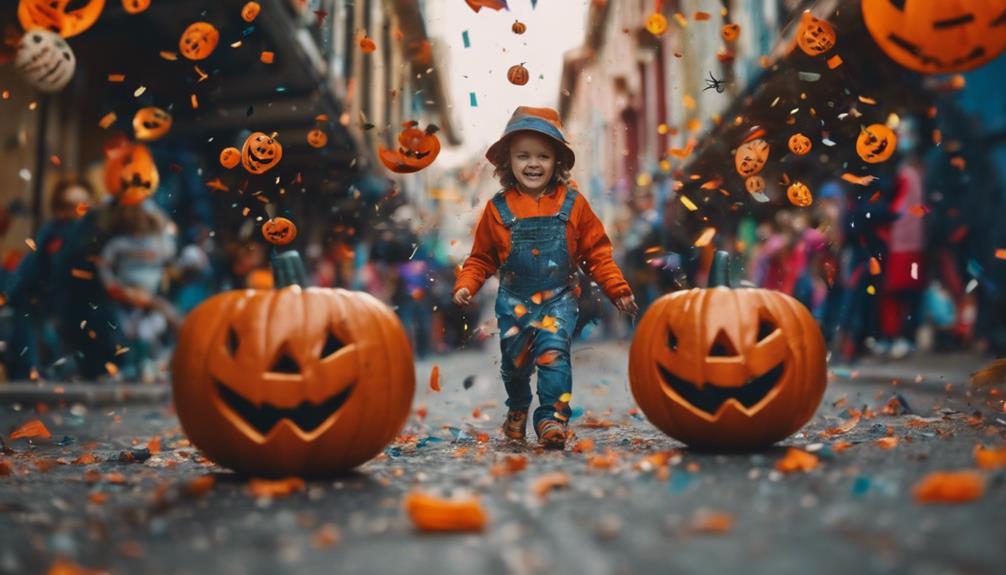
As you explore the world's fascination with Halloween, you'll notice that in recent years, the holiday has experienced a surge in popularity, transcending cultural boundaries and becoming a global phenomenon.
This rise in popularity has led to a significant increase in Halloween-themed events, decorations, and costumes. Even in countries like South Africa, where Halloween isn't traditionally celebrated, you'll find an increasing number of people embracing the spooky spirit.
South African retailers have taken note of this trend, stocking up on Halloween-themed merchandise to cater to the growing demand.
As a result, Halloween has become a significant commercial opportunity, with businesses capitalizing on the festive atmosphere.
Social media platforms have also played a significant role in fueling the global popularity of Halloween, allowing people to share their costumes, decorations, and party ideas with a global audience.
The holiday's global appeal has been further amplified by the rise of international franchises, such as haunted houses and horror-themed escape rooms.
As Halloween continues to gain traction worldwide, it's clear that this ancient festival has evolved into a modern-day cultural phenomenon.
Origins of the Spooky Celebration
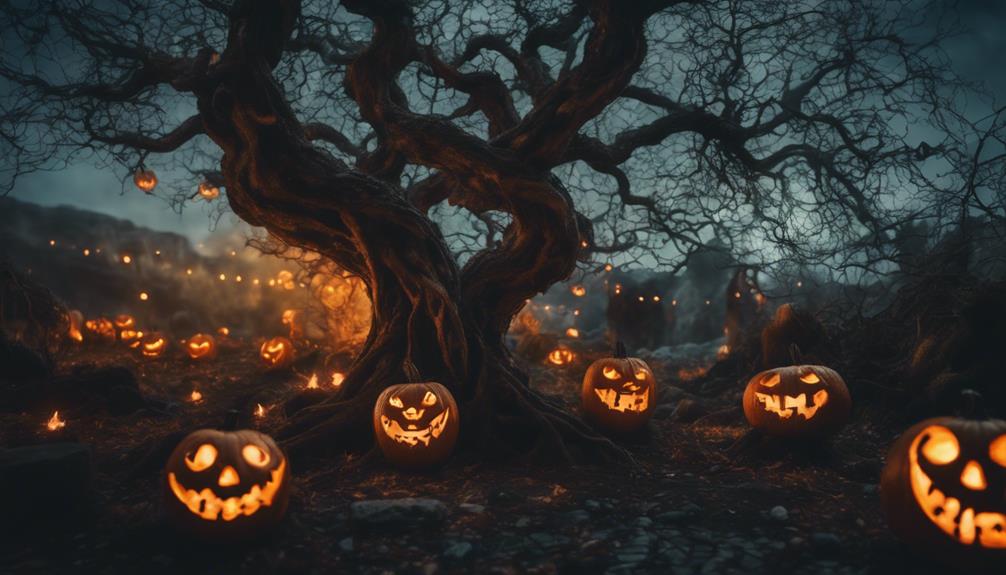
As you explore the origins of Halloween, you'll discover that the celebration has its roots in ancient Celtic traditions.
You'll learn that the Celts believed the boundary between the spirit world and the living was at its thinnest on Samhain, a festival marking the end of summer and harvest season.
This ancient festival, combined with the Christian holiday of All Saints Day, has evolved into the spooky celebration we've come to understand today.
Celtic Roots Uncovered
Uncovering the Celtic roots of Halloween reveals a rich history, with the ancient Celtic festival of Samhain being the precursor to the modern-day spooky celebration you enjoy today.
The Celts, who inhabited what's now the United Kingdom, Ireland, and northern France, celebrated Samhain on November 1st. This marked the end of the harvest season and the beginning of winter, a time when the Celts believed the boundary between the living and the dead became blurred.
During Samhain, the Celts would light bonfires, wear costumes, and leave food and drink offerings for their ancestors. They believed that on this night, spirits of the dead returned to the world of the living. The Celts would also perform rituals to ward off any malevolent spirits.
As the Roman Empire expanded, it merged its own festivals with the Celtic traditions, laying the groundwork for modern-day Halloween. You can still see echoes of these ancient Celtic traditions in the way you celebrate Halloween today, from dressing up in costumes to carving jack-o'-lanterns.
Ancient Festivals Influenced
Influenced by a mix of ancient festivals, the spooky celebration of Halloween evolved over time, absorbing traditions from the Roman Empire and early Christianity.
As you explore into the history of Halloween, you'll discover that it's a melting pot of ancient customs.
The Roman festival of Pomona, celebrated on November 1, was a harvest festival, which later merged with the Christian celebration of All Saints' Day.
You'll also find echoes of the ancient Celtic festival of Samhain, which marked the end of the harvest season.
As a South African, you might be surprised to learn that these ancient festivals have contributed to the modern-day celebration of Halloween.
The blending of these festivals has resulted in the unique celebration we're familiar with today.
You might wonder how these ancient festivals have influenced the modern celebration, and the answer lies in the evolution of traditions and customs over time.
As you examine the history of Halloween, you'll uncover the rich tapestry of ancient festivals that have shaped this spooky celebration.
Samhain Night Origins
Samhain, an ancient Celtic festival, marked the end of the harvest season and the beginning of the darker half of the year. This was a time when the Celts believed the boundaries between the spirit world and the living were at their thinnest.
During Samhain, the Celts would gather to burn animals and crops in bonfires as sacrifices to the Celtic gods and deities. People would dress up in costumes and dance around the bonfires.
This festival was tied to the cycle of life and death, and people believed that spirits, good and bad, could more easily enter the physical world during Samhain.
The tradition of trick-or-treating might've originated from Irish and Scottish holidays in which people would dress up and visit homes to perform antics, sing a song, recite a poem, etc. in return for a treat.
Samhain was celebrated on November 1, which is now known as All Saints' Day, and the evening before became known as All Hallows' Eve, later shortened to Halloween.
South Africa's Halloween History

As South Africans began to adopt Western cultural practices, Halloween's popularity started to grow, albeit slowly, in the country. You might be surprised to learn that Halloween was not widely recognized in South Africa until about a decade ago, and its celebration is still not as widespread as in North America and Europe.
| Year | Halloween Celebrations | Popularity |
|---|---|---|
| 2010 | Low-key parties and gatherings | Low |
| 2015 | Increased popularity, especially among youth | Moderate |
| 2020 | More organized events, festivals, and activities | High |
| 2022 | Widespread acceptance, with many events and festivals | Very High |
The younger generation in South Africa is driving the popularity of Halloween, largely due to the influence of American horror movies and Western culture. Despite growing popularity, Halloween is not deeply rooted in South African culture, and some individuals are against its celebration, viewing it as a commercialized American tradition.
Embracing the American Tradition
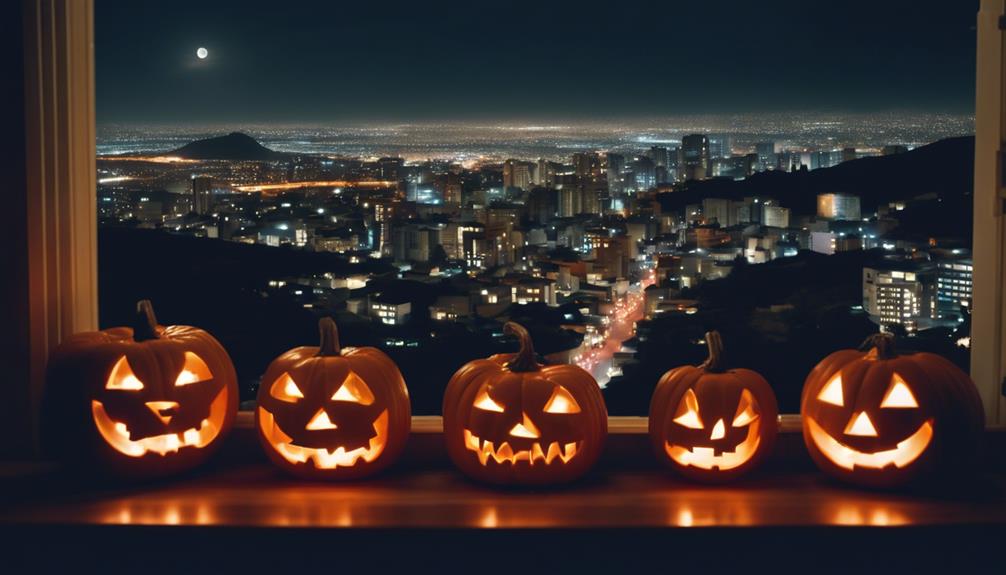
Embracing the American tradition, South Africans, particularly the younger generation, have started to celebrate Halloween with enthusiasm, albeit with a unique local twist.
You'll find that Halloween parties are becoming increasingly popular, especially in urban areas where American culture has a stronger influence. These parties often feature costume contests, horror movie marathons, and spooky decorations, blending the traditional American Halloween spirit with a South African flair.
As the commercial aspect of Halloween gains traction, nightclubs and event organizers are cashing in on the trend, hosting Halloween-themed events that attract large crowds. While some South Africans remain skeptical about adopting American traditions, the younger generation is driving the growth of Halloween celebrations in the country.
With the rise of Halloween parties and events, it's clear that South Africa is slowly but surely embracing the American tradition of Halloween, albeit with its own unique spin.
Trick-or-Treating in Urban Areas
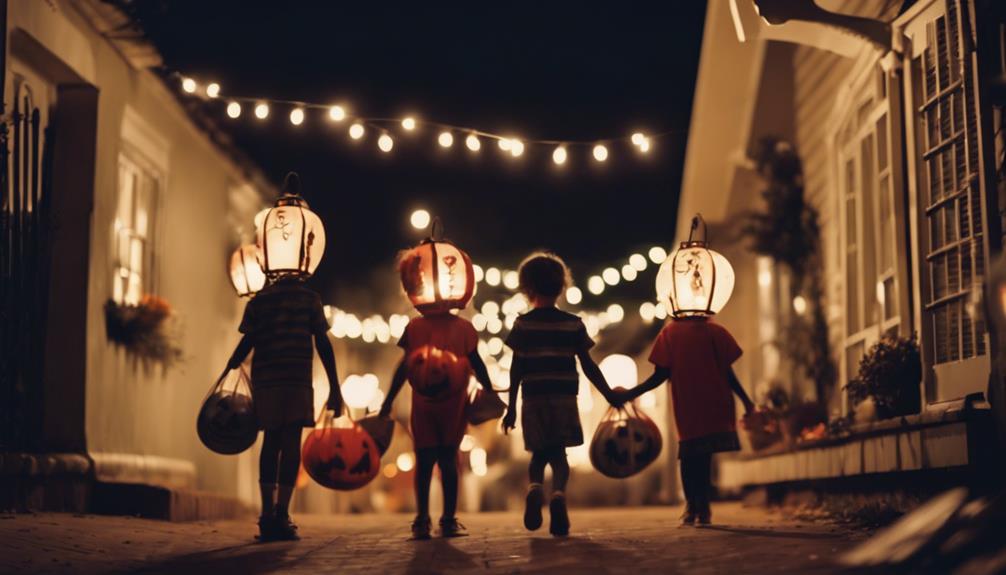
While Halloween parties are gaining popularity in urban areas, trick-or-treating, a cornerstone of the American Halloween experience, remains elusive in South Africa. You might expect to see kids in costumes going door-to-door, but due to safety and security concerns, this tradition hasn't taken hold. The high crime rate and fear of danger make it unsafe for children to venture out in the evening, making trick-or-treating a rare sight in urban areas.
Instead, children participate in organized Halloween activities at community centers or secure estates, providing a safer alternative. Parents are hesitant to let their kids go door-to-door, opting for these alternative celebrations instead. This lack of trick-or-treating in urban areas reflects the broader concerns about safety and security in South Africa.
| Urban Areas | Trick-or-Treating |
|---|---|
| High crime rate | Not safe for children |
| Fear of danger | Alternative celebrations preferred |
| Safety concerns | Trick-or-treating rare or non-existent |
Halloween Events in South Africa
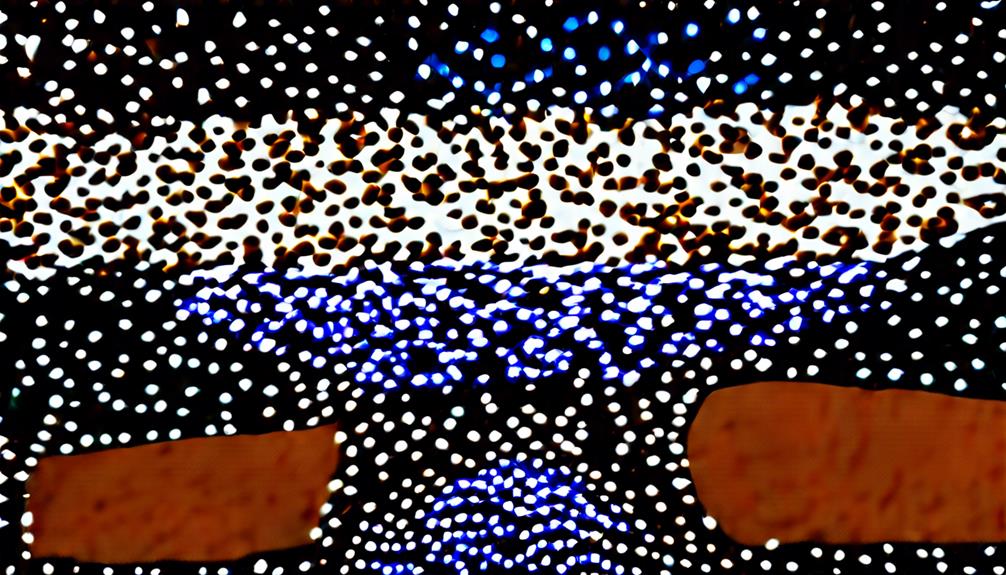
South Africa's Halloween events are a treat for thrill-seekers, with spooky celebrations and haunted houses popping up across the country.
From the South African Horrorfest to smaller gatherings, there's no shortage of eerie entertainment to get you in the mood for Halloween.
As you explore the country's Halloween scene, you'll discover a range of events that cater to different tastes and ages.
Spooky Celebrations Rise
As Halloween's popularity grows in South Africa, an array of spooky celebrations and events are springing up across the country. You'll find a range of activities, from organized Halloween parties at community centers to themed events in the capital city. These events often feature live music, costume contests, and even zombie walks.
| Event | Location | Description |
|---|---|---|
| South African Horrorfest | Cape Town | Scary movie showcase, indie film competition, and live performances |
| Halloween Party | Pretoria | Themed party with live music and costume contest |
| Zombie Walk | Johannesburg | A spooky procession through the city streets |
While trick-or-treating isn't common in South Africa due to safety concerns, kids can still participate in organized Halloween activities at secure estates or community centers. As the popularity of Halloween continues to rise, you can expect even more spooky celebrations to emerge across the country.
Haunted Houses Abound
Spine-tingling thrills await you at South Africa's haunted houses, where eerie atmospheres and terrifying tales come alive on Halloween night. You'll find yourself creeping through dark corridors, dodging ghostly apparitions, and screaming at every unexpected fright.
From creepy asylums to haunted mansions, these events promise to deliver a chilling experience like no other.
Haunted houses have become a staple of Halloween celebrations in South Africa, attracting thrill-seekers from all over the country. You can expect to encounter all manner of terrifying creatures, from zombies to vampires, as you make your way through the haunted attractions.
Many of these events also feature live actors, special effects, and state-of-the-art lighting and sound systems to create an immersive experience.
Whether you're a horror fan or just looking for a fun and frightening way to celebrate Halloween, South Africa's haunted houses have got you covered. So, if you dare, step into the unknown and face your fears head-on this Halloween.
Who knows what terrors await you?
Cultural Fusion and Exchange
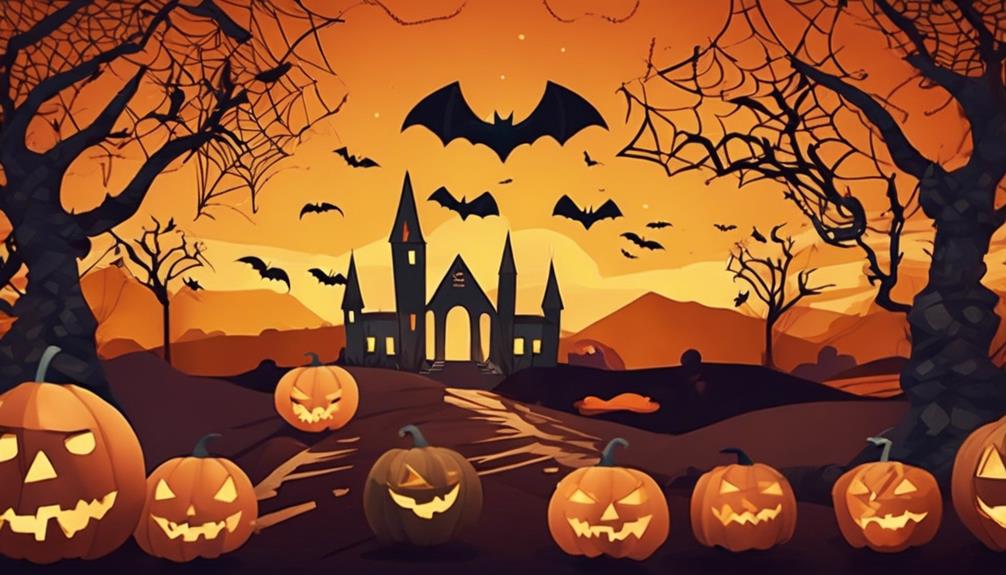
South Africa's Halloween celebrations are a dynamic blend of Western influences and local cultural practices, resulting in a unique fusion of traditions that reflect the country's complex history of cultural exchange.
As you explore the country's Halloween celebrations, you'll notice a cultural fusion of traditional Western customs and local cultural practices. This blending of traditions has resulted in a unique and eclectic cultural experience.
The adaptation of Halloween traditions, such as trick-or-treating, has been influenced by local cultural norms and values. The cultural exchange between South Africa and the West has led to the creation of a distinct cultural identity that blends elements of indigenous, European, and Asian cultures.
This cultural fusion is a reflection of the country's complex history of cultural exchange and fusion. As you experience Halloween in South Africa, you'll witness a celebration that's truly one-of-a-kind, shaped by the country's diverse cultural heritage.
Halloween's Growing Popularity
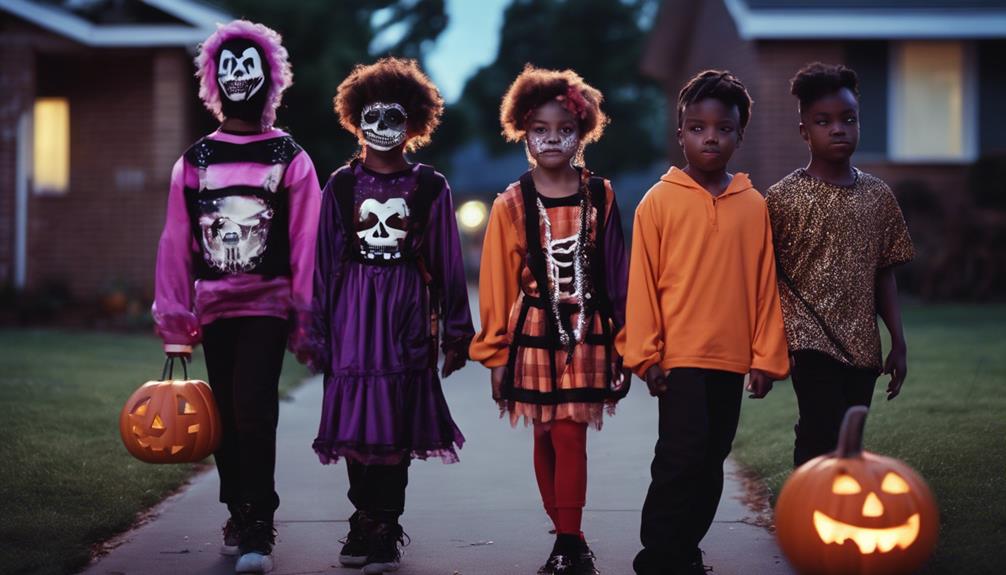
You'll notice a surge in Halloween celebrations in South Africa, particularly among the younger generation, as American horror movies and Western culture continue to shape their interests and tastes.
This influence has contributed to the growing popularity of Halloween in South Africa.
Despite concerns about safety, private and public Halloween parties are becoming more popular, with nightclubs capitalizing on the event by hosting Halloween-themed parties.
For some individuals, Halloween is solely about dressing up, and the commercial aspect of the holiday is gaining traction in the country.
As a result, Halloween is becoming increasingly popular in South Africa, with many embracing the festive atmosphere and creative expression it offers.
The commercial aspect of Halloween is also becoming more prominent, with businesses catering to the demand for costumes, decorations, and party supplies.
As Halloween's popularity continues to grow in South Africa, it will be interesting to see how the country's unique cultural landscape adapts to this Western tradition.
A New Era of Celebrations
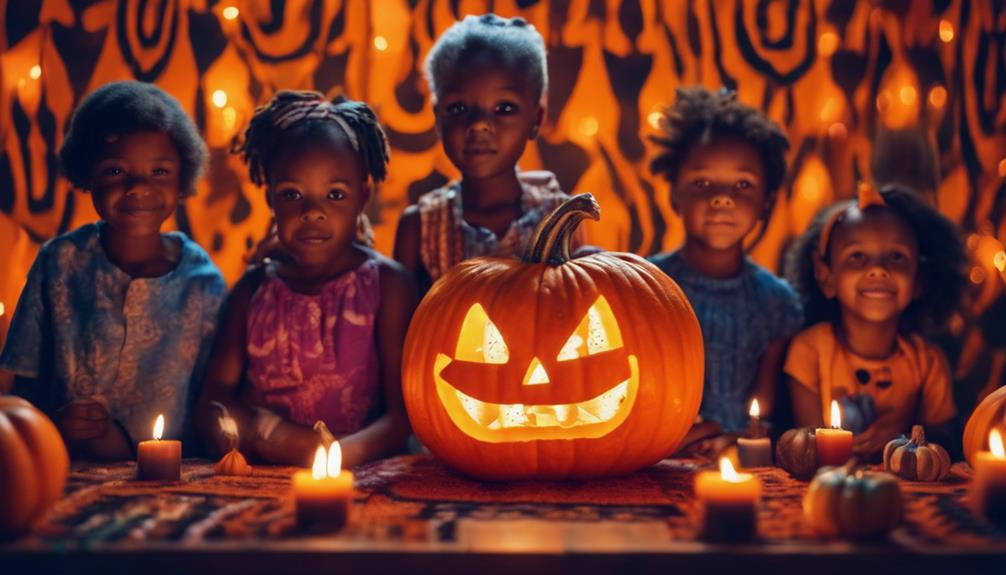
As the popularity of Halloween grows in South Africa, a new era of celebrations is emerging, with creative and spooky festivities taking center stage.
You're likely to find unique events and activities that cater to your interests, from costume contests to zombie walks and horror movie screenings. These events are often held in secure locations, such as community centers or private estates, due to safety concerns.
Despite the limitations, South Africans are finding ways to celebrate Halloween in style. You might stumble upon private parties, public events, or even Halloween-themed activities that showcase the country's creative side.
The commercial aspect of Halloween is also gaining traction, with businesses capitalizing on the festive spirit.
As you explore South Africa's Halloween scene, you'll discover a blend of American influence and local flair, creating a unique experience that's both spooky and fun.
Frequently Asked Questions
Do We Get Halloween in South Africa?
You might be wondering, do you get Halloween in South Africa?
The answer is yes, but with a twist. While it's not a deeply rooted tradition, Halloween is gaining popularity, especially among the younger generation, thanks to American horror movies and Western cultural influence.
You'll find organized Halloween activities at community centers or secure estates, but no trick-or-treating due to safety concerns.
Do African Countries Celebrate Halloween?
African countries do not widely observe Halloween, as it is a traditionally Western holiday.
Halloween has its roots in ancient Celtic festivals, and its modern celebrations are more prevalent in countries with significant European influences.
While some African countries may have adopted Halloween festivities, it's not a deeply ingrained cultural tradition on the continent.
What Festivals Do South Africans Celebrate?
As you explore the vibrant culture of South Africa, you'll discover a diverse array of festivals that reflect the country's rich heritage.
You'll find the Cape Town International Jazz Festival, a celebration of music and art, and the Klein Karoo National Arts Festival, showcasing the country's performing arts.
The Grahamstown National Arts Festival, a premier cultural event, features music, dance, and theater performances.
These festivals offer a glimpse into South Africa's thriving cultural landscape.
What Is South Africa's National Celebration?
South Africa's national celebration is Freedom Day, commemorating the country's first democratic elections in 1994.
It's celebrated on April 27th every year, marking the nation's shift from apartheid to democracy.
This significant event is a public holiday, and South Africans come together to reflect on their country's history and progress.
It's a day filled with festivities, music, and reflection.
Conclusion
As you explore South Africa's Halloween scene, you'll find a cultural melting pot where traditions blend like the threads of a rich tapestry.
Like a spark igniting a fire, Halloween's popularity is spreading rapidly, illuminating the country's urban landscapes with a vibrant display of costumes, decorations, and festivities.
As the celebration continues to grow, it's clear that South Africa is embracing the spooky spirit, weaving a unique narrative that's both a reflection of cultural exchange and a reflection of the country's dynamic identity.
Hi, I’m Absinthe. I help manage Halloween Product Reviews, the only website you’ll need for all your Halloween essentials. My favorite holiday is, undoubtedly, Halloween. I thrive on the spooky atmosphere, the creative costumes, and yes—the candy! I am always on the lookout for new and exciting ways to celebrate and share my discoveries to enhance your Halloween experience. Make sure to visit us, and I promise you’ll find something to make your Halloween unforgettable!
Halloween
Religions Which Do Not Celebrate Halloween
Peek into the diverse beliefs of religions like Jehovah's Witnesses and Seventh-day Adventists that abstain from Halloween celebrations for intriguing reasons.
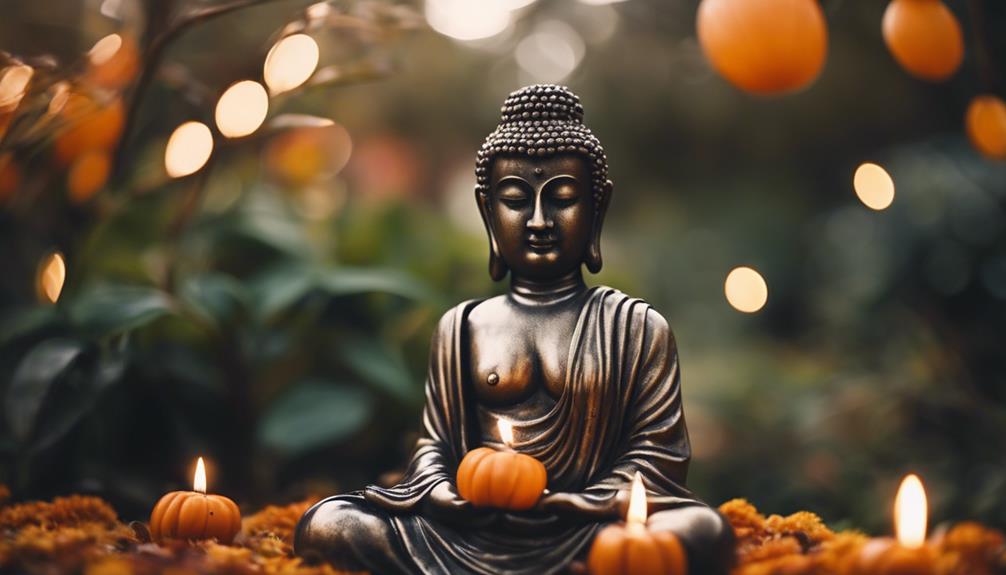
Jehovah's Witnesses, Seventh-day Adventists, Orthodox Judaism, Islam, and some Protestant denominations do not celebrate Halloween. Reasons include beliefs conflicting with pagan customs and prioritizing spiritual practices over secular festivities. Alternative events in line with their faith are organized. Buddhism and Hinduism do not specifically address Halloween, focusing on mindfulness, compassion, meditation, and Diwali as a significant Hindu festival. Southern Baptists also vary in views on Halloween, with some avoiding it due to beliefs. Various religions offer unique perspectives on Halloween celebrations, each rooted in their beliefs. Further insights into different religious practices are available in the detailed research.
Key Takeaways
- Jehovah's Witnesses abstain due to Halloween's pagan origins.
- Seventh-day Adventists avoid Halloween activities.
- Orthodox Judaism refrains from celebrating Halloween.
- Islam focuses on Eid and doesn't observe Halloween.
- Some Protestant denominations, like Southern Baptists, may reject Halloween celebrations.
Jehovah's Witnesses
Jehovah's Witnesses abstain from celebrating Halloween due to their belief that it's a pagan custom with no spiritual significance. For Jehovah's Witnesses, Halloween is considered a pagan holiday that isn't aligned with their religious beliefs. They view holidays like Halloween as closely tied to pagan customs and idolatry, which goes against their teachings.
Instead of partaking in Halloween festivities, Jehovah's Witnesses prioritize worship and spiritual activities that align with their faith. This means that they don't engage in Halloween traditions or celebrations, opting to distance themselves from what they perceive as pagan rituals.
Seventh-day Adventists

Concerned about superstition and the holiday's origins, Seventh-day Adventists don't participate in Halloween activities. Halloween isn't a religious observance in Seventh-day Adventist beliefs, and they prioritize spiritual practices, which may lead them to avoid Halloween due to its secular and potentially superstitious nature.
In accordance with their teachings, Seventh-day Adventists emphasize healthy living and steer clear of practices that contradict their faith, including Halloween celebrations. Instead of Halloween festivities, some Seventh-day Adventist churches may opt to organize alternative events like fall festivals or harvest celebrations that align more with their religious beliefs.
Orthodox Judaism
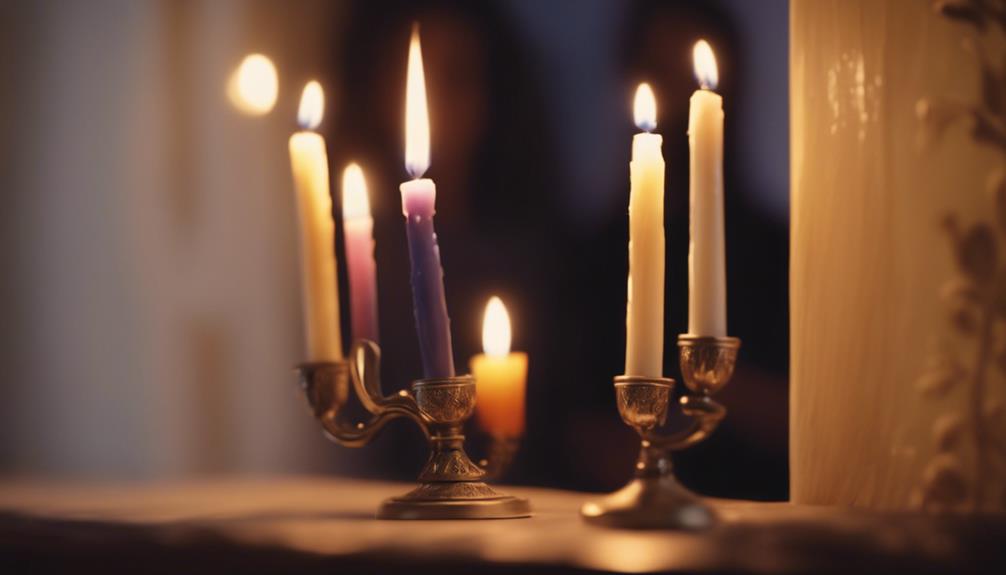
Orthodox Judaism refrains from celebrating Halloween due to its non-Jewish origins and pagan undertones. Orthodox Jews, adhering to their religious beliefs, avoid partaking in Halloween festivities.
This secular holiday, despite its religious roots dating back thousands of years, doesn't align with Orthodox Jewish traditions. Instead, Orthodox Judaism emphasizes Jewish holidays and customs over Halloween celebrations.
Some Orthodox Jews may choose to engage in alternative autumn-themed activities to mark the season without participating in Halloween-related events. The decision to abstain from Halloween activities stems from the values and principles upheld in Orthodox Jewish communities.
Islam
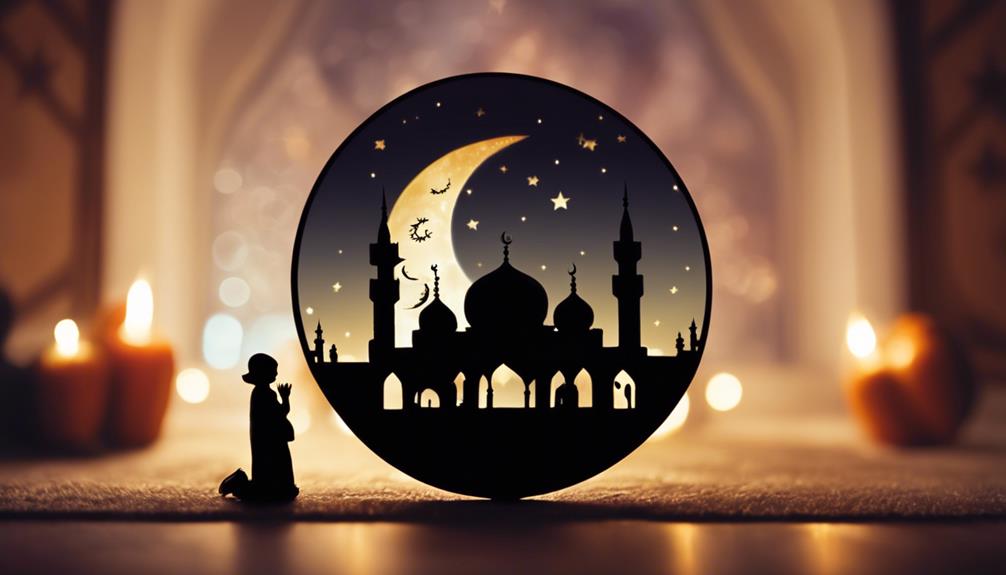
In Islam, the observance of Halloween isn't a common practice due to its pagan origins and lack of spiritual significance within the faith. Halloween is considered a pagan holiday with no place in Islamic customs. Many Muslims don't participate in Halloween festivities due to concerns that it promotes mischief rather than moral values.
The focus in Islam is on the celebration of the two annual holidays, Eid al-Fitr and Eid al-Adha, which hold deep religious significance. As a result, the majority of Muslims choose not to partake in Halloween activities. Instead, some may opt for alternative autumn-themed celebrations or simply focus on the Islamic holidays that are integral to their faith.
The decision to refrain from Halloween is rooted in the desire to uphold Islamic beliefs and values, steering clear of practices that are viewed as contradictory to the teachings of Islam.
Certain Protestant Christian Denominations
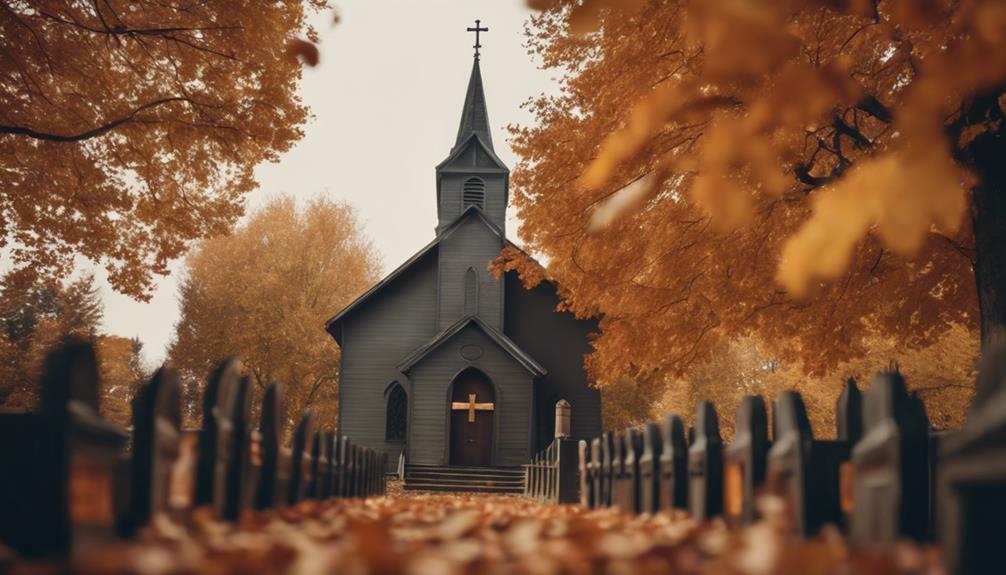
Certain Protestant Christian denominations exhibit varying perspectives on the observance of Halloween, reflecting a spectrum of views within the faith community. When it comes to Halloween festivities, religious groups within Protestantism may take different stances:
- Some Baptist churches reject Halloween due to its pagan origins and association with superstitions.
- Southern Baptists, known for their conservative stance, often avoid celebrating Halloween.
- Protestant schools may discourage Halloween celebrations through informational packets sent to parents.
- Certain Protestant denominations prioritize religious holidays over Halloween festivities.
- The views on Halloween within Protestant Christian denominations can vary widely.
Within Protestantism, the approach to Halloween can be influenced by theological beliefs, cultural considerations, and individual interpretations of scripture. It's important to recognize that there's diversity in how different denominations navigate the question of participating in Halloween activities, with some choosing to abstain while others may find ways to engage with the holiday in a manner consistent with their faith.
Buddhism
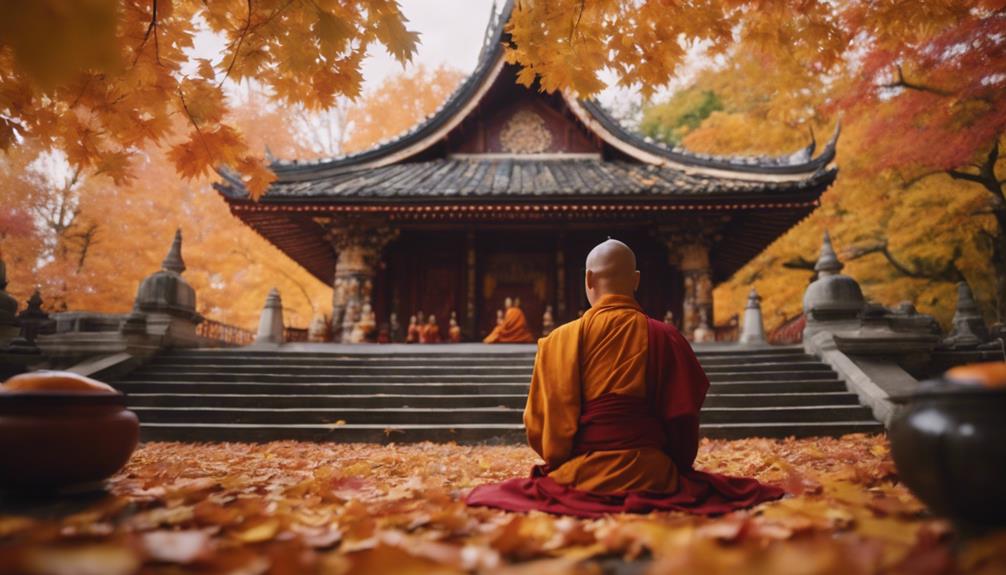
Wondering how Buddhism views Halloween celebrations?
Buddhism doesn't have a specific stance on Halloween as it isn't a traditional Buddhist holiday. Some Buddhist practitioners may choose not to celebrate Halloween due to its Western cultural origins. Instead of external celebrations like Halloween, Buddhism focuses on mindfulness, compassion, and inner reflection.
Buddhist teachings emphasize the impermanence of life and the importance of cultivating positive qualities. During the fall season, Buddhist communities may engage in meditation retreats or spiritual practices rather than participating in Halloween festivities. Since Halloween isn't a significant holiday within Buddhism, followers typically don't actively celebrate the holiday.
The focus remains on personal growth, self-awareness, and spiritual development, aligning with the core principles of the Buddhist faith. This approach highlights the internal journey of individuals rather than external observances of a fall festival like Halloween.
Hinduism
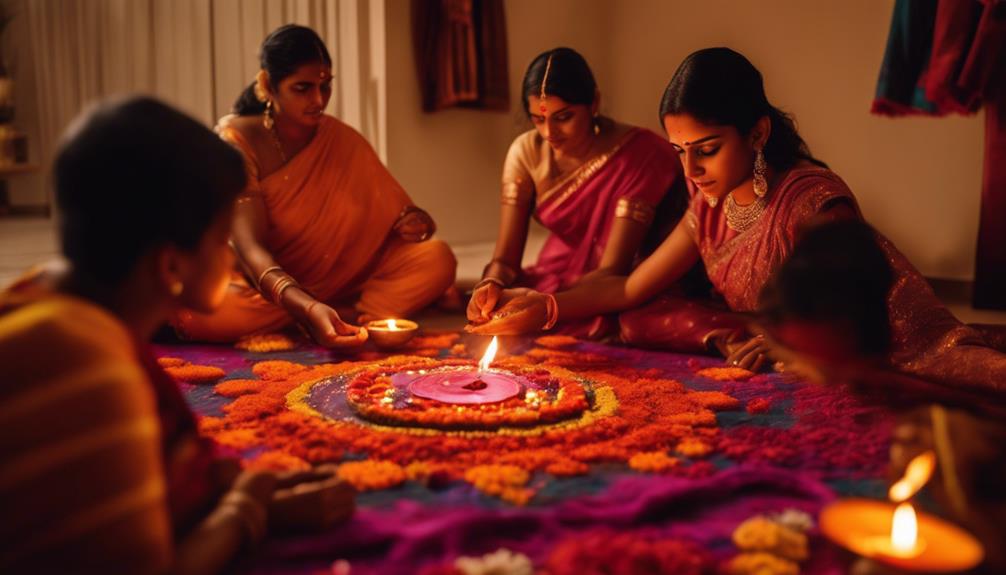
Considering the rich tradition of celebrations in Hinduism, Diwali stands out as a significant festival known as the Festival of Lights. During Diwali:
- Homes are adorned with colorful lights and candles, symbolizing the victory of light over darkness.
- Families come together for prayers and rituals, fostering a sense of unity and gratitude.
- Delicious sweets and treats are shared among loved ones, spreading joy and warmth.
- Exchanging gifts is a common practice, reflecting the spirit of giving and generosity.
- Fireworks light up the night sky, adding to the festive atmosphere and creating a sense of jubilation.
For many Hindus, Diwali holds deep cultural and religious significance, making it a time of reverence and celebration. The focus on light, goodness, and togetherness during Diwali often leads some Hindus to prioritize these traditional festivities over Halloween, opting for autumn-themed celebrations that align more closely with their beliefs.
Southern Baptists
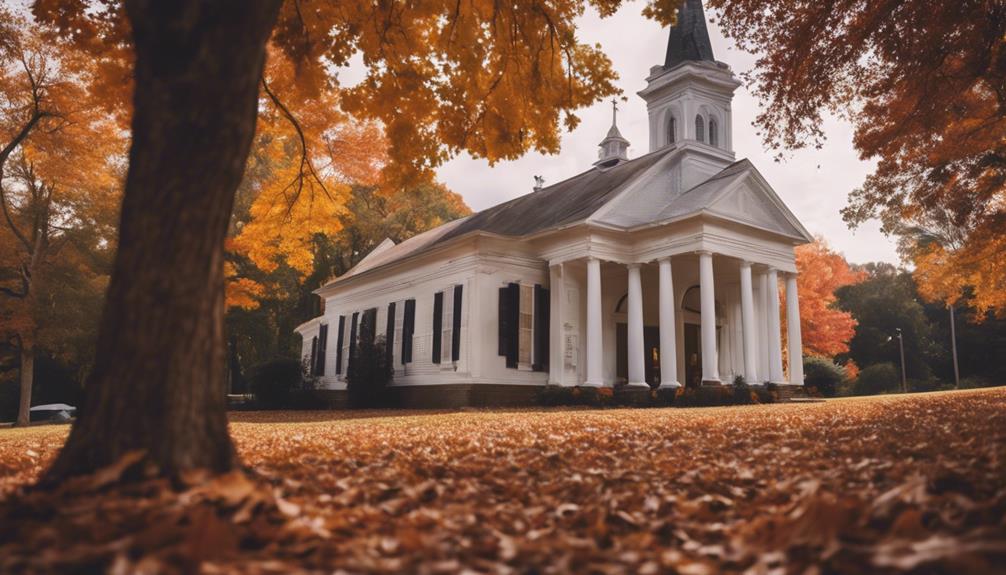
Southern Baptists, known for their conservative and fundamentalist beliefs, may hold varying perspectives on the celebration of Halloween. Some Baptist churches, including Southern Baptists, reject the observance of Halloween due to its perceived contradictions with their religious values. Within Southern Baptist communities, the view on Halloween can differ based on individual beliefs and teachings of the specific church.
It isn't uncommon for Southern Baptist schools to discourage or caution against participating in Halloween activities, citing concerns about the holiday's origins and associations with the occult. The conservative nature of Southern Baptist beliefs often leads to a cautious approach towards Halloween, with some members choosing to abstain from the festivities altogether. While not all Southern Baptists may completely reject Halloween, many approach the holiday with discernment and a desire to align their actions with their religious convictions.
Ultimately, the stance on Halloween within Southern Baptist circles can vary, reflecting the diversity of opinions and interpretations within this religious group.
Frequently Asked Questions
Do Muslims Not Celebrate Halloween?
Muslims don't celebrate Halloween due to its pagan origins and lack of spiritual significance. Some Muslims feel it promotes mischief over morals. Instead, Islamic holidays like Eid al-Fitr and Eid al-Adha are revered.
Most Muslims choose autumn-themed festivities or focus on Islamic celebrations. Halloween holds no place in traditional Muslim practices.
Do Jews Celebrate Halloween?
You might wonder if Jews celebrate Halloween. In general, Orthodox and Conservative Judaism avoid Halloween due to its pagan origins. Reform Judaism varies, with some schools shying away from the holiday.
While some Jewish families permit trick-or-treating, Halloween is typically not a big family celebration. Instead, Jewish communities may opt for alternative autumn-themed festivities to replace Halloween.
Where Does the Bible Say Not to Celebrate Halloween?
The Bible doesn't specifically mention Halloween, a modern holiday with pagan roots. However, Deuteronomy 12:31-32 cautions against adopting pagan customs. It's advised to avoid practices conflicting with faith.
Some interpret these principles as a reason not to celebrate Halloween. Personal biblical interpretations influence this decision.
Are Catholics Not Allowed to Celebrate Halloween?
You're allowed to celebrate Halloween as a Catholic, as long as it aligns with your faith and values. Some Catholics may choose to avoid traditions with pagan origins, but the Vatican hasn't officially prohibited Halloween celebrations.
Many Catholic parishes and schools host events focusing on fun and community. Ultimately, individual Catholics can decide how to approach Halloween based on personal beliefs and traditions.
Conclusion
To sum up, there are several religions that don't celebrate Halloween, such as Jehovah's Witnesses, Seventh-day Adventists, Orthodox Judaism, Islam, certain Protestant Christian denominations, Buddhism, Hinduism, and Southern Baptists.
Each of these faiths has its own beliefs and practices that guide their decision not to participate in this holiday.
Understanding and respecting these differences can help foster a sense of inclusivity and appreciation for the diverse cultural and religious traditions in our world.
Hi, I’m Absinthe. I help manage Halloween Product Reviews, the only website you’ll need for all your Halloween essentials. My favorite holiday is, undoubtedly, Halloween. I thrive on the spooky atmosphere, the creative costumes, and yes—the candy! I am always on the lookout for new and exciting ways to celebrate and share my discoveries to enhance your Halloween experience. Make sure to visit us, and I promise you’ll find something to make your Halloween unforgettable!
Halloween
Does Everyone Celebrate Halloween Around the World?
Keen to uncover how Halloween is celebrated worldwide? Discover diverse traditions beyond the typical October 31st festivities.
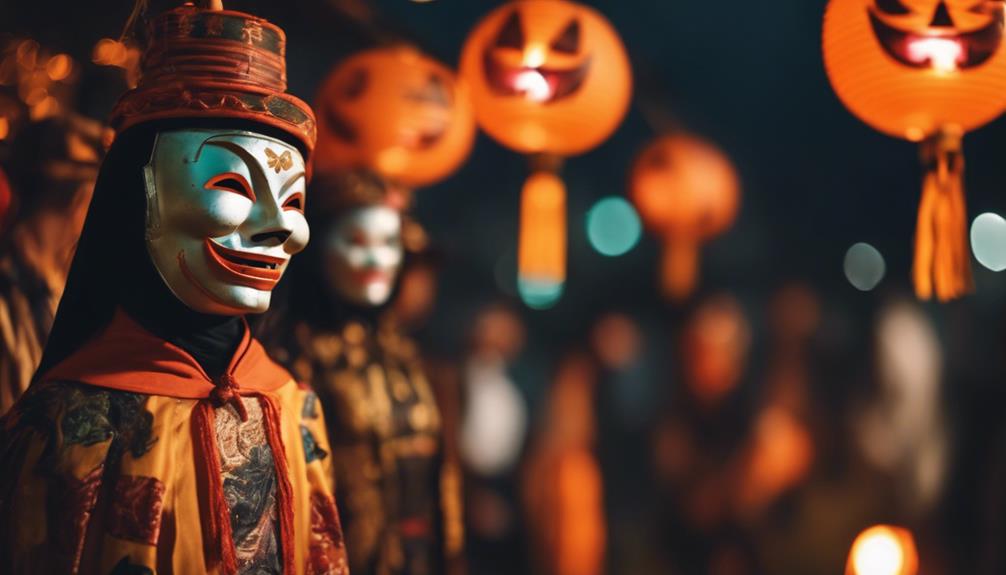
Around the world, Halloween is not universally celebrated by everyone. Various countries embrace different traditions, like Día de los Muertos in Latin America, blending Halloween customs with local traditions in Japan, or prioritizing Guy Fawkes Day in England. While countries such as Australia, France, and Italy do celebrate Halloween, it's not a global phenomenon. Understanding cultural variations in how different regions observe Halloween can provide a deeper appreciation for the diverse traditions worldwide. By exploring the unique ways each country approaches Halloween, you can discover a rich tapestry of customs and celebrations beyond the well-known October 31st festivities.
Key Takeaways
- Global Halloween celebrations vary widely
- Many countries celebrate Halloween
- Some regions prioritize other cultural festivals
- Diverse traditions influence Halloween observance
- Not all countries observe Halloween
Global Halloween Celebration Trends
Global Halloween celebrations have seen a significant uptick in popularity around the world, especially among young urban dwellers in various countries. Over the last 30 years, Halloween has become a global phenomenon, with countries like Australia, France, Greece, Poland, and Italy embracing the festivities.
Articles highlighting '13 ways Halloween is celebrated around the world' and '20 Halloween-like traditions from around the world' showcase the diverse and evolving trends in Halloween celebrations. European nations and even non-traditional countries like Saudi Arabia have put their unique spin on Halloween, demonstrating its global appeal and adaptability.
Initially met with resistance in some regions, Halloween has been embraced with open arms, with traditions like costume parties, trick-or-treating, and themed games being integrated into diverse cultural contexts. The growing popularity of Halloween among young urban populations worldwide underscores its status as a widely celebrated and beloved holiday across borders and traditions.
Cultural Variations in Halloween Observance
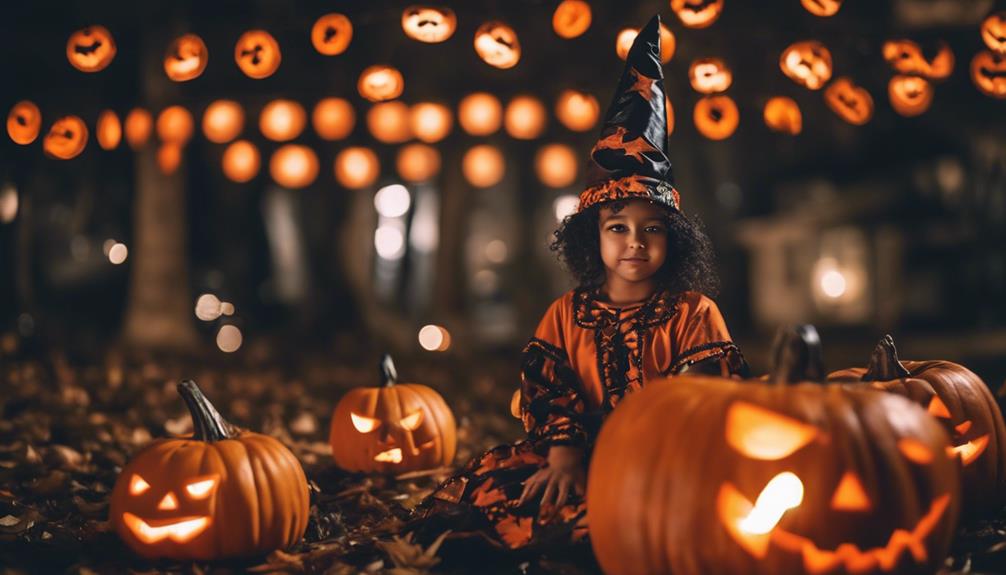
When it comes to observing Halloween, cultural variations play a significant role in how different countries and regions approach the holiday.
Latin American countries, for instance, have their own unique traditions during this time. They celebrate Día de los Muertos, a day dedicated to honoring deceased relatives with colorful altars, sugar skulls, and marigolds.
In Japan, Halloween customs are blended with traditional practices like the Obon Festival, where ancestors are honored through dance and ceremonies.
In England, the focus shifts to Guy Fawkes Day, prioritizing this historical event over Halloween celebrations.
These examples showcase how cultural celebrations can influence the observance of Halloween, highlighting the diverse ways in which different regions mark this time of year. As a result, the worldwide observance of Halloween varies greatly, reflecting the rich tapestry of global traditions and customs that shape our collective cultural landscape.
Non-Halloween Festivals Worldwide
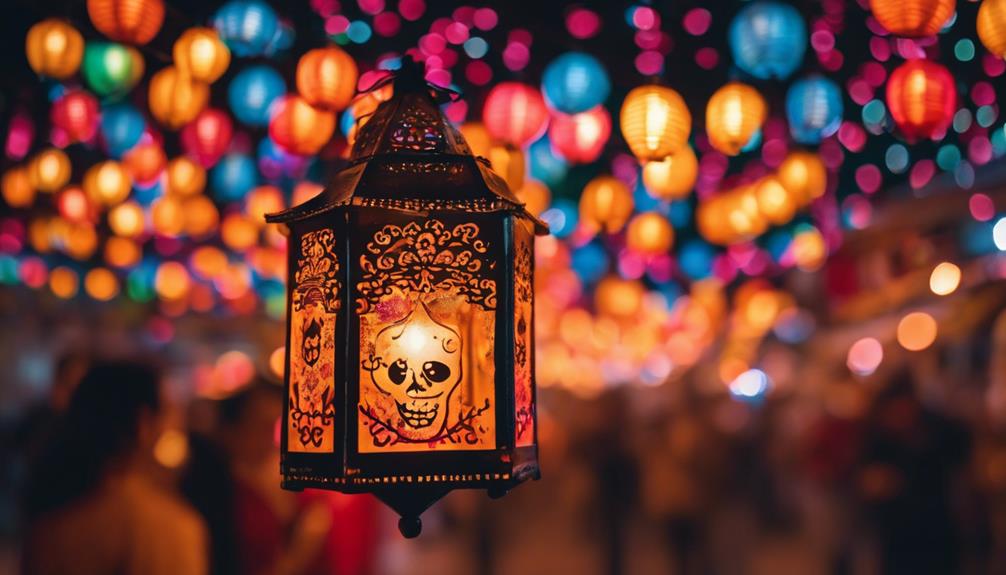
Cultural variations in holiday observance extend beyond Halloween to a diverse array of non-Halloween festivals celebrated worldwide. These international holidays showcase unique ways of honoring the deceased and upholding cultural traditions. Here are some examples of non-Halloween festivals around the world:
| Festival | Country | Date |
|---|---|---|
| Day of the Dead | Mexico | Nov. 1-2 |
| Barriletes Gigantes festival | Guatemala | Early Nov. |
| Día de los Muertos | Mexico | Nov. 1-2 |
| Ognissanti | Italy | Nov. 1 |
| Guy Fawkes Day | England | Nov. 5 |
In Mexico, the Día de los Muertos festival overshadows Halloween, focusing on honoring deceased loved ones with offerings. Guatemala's Barriletes Gigantes festival features giant kites flown over graves to connect the living and the dead. Italy's Ognissanti and England's Guy Fawkes Day also pay tribute to the deceased with unique cultural practices. These global celebrations highlight the diversity of traditions observed beyond Halloween around the world.
Halloween Customs in Different Countries
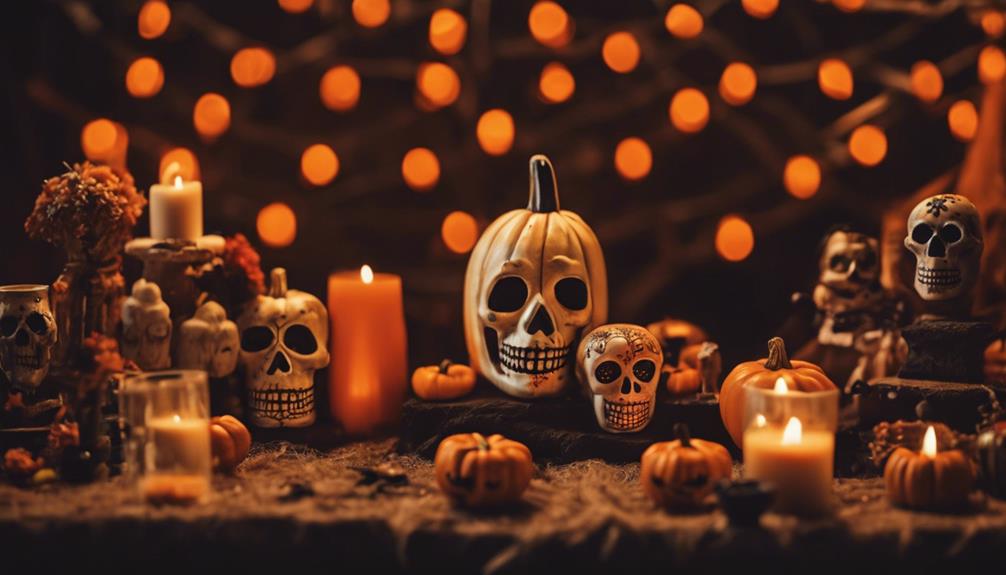
As Halloween approaches, exploring the diverse customs practiced in different countries can provide insight into the varied ways this holiday is celebrated worldwide.
In Mexico, children go trick-or-treating on October 31 and celebrate el Día de los Muertos on November 1 and 2, honoring their deceased loved ones.
England commemorates Guy Fawkes Day on November 5 with bonfires and children asking for a penny for the Guy, a traditional effigy.
Italy celebrates Ognissanti on November 1 with varying regional traditions, such as deceased individuals bringing gifts to children in Sicily.
Guatemala celebrates the Barriletes Gigantes festival in early November, where giant kites are flown over the graves of loved ones as a way to remember and honor them.
In Japan, Halloween is a newer holiday focused on costumes for parties and clubs, reflecting a more modern approach to the celebration.
These customs showcase the rich diversity of Halloween traditions across different countries around the world.
Diversity in Halloween Celebrations
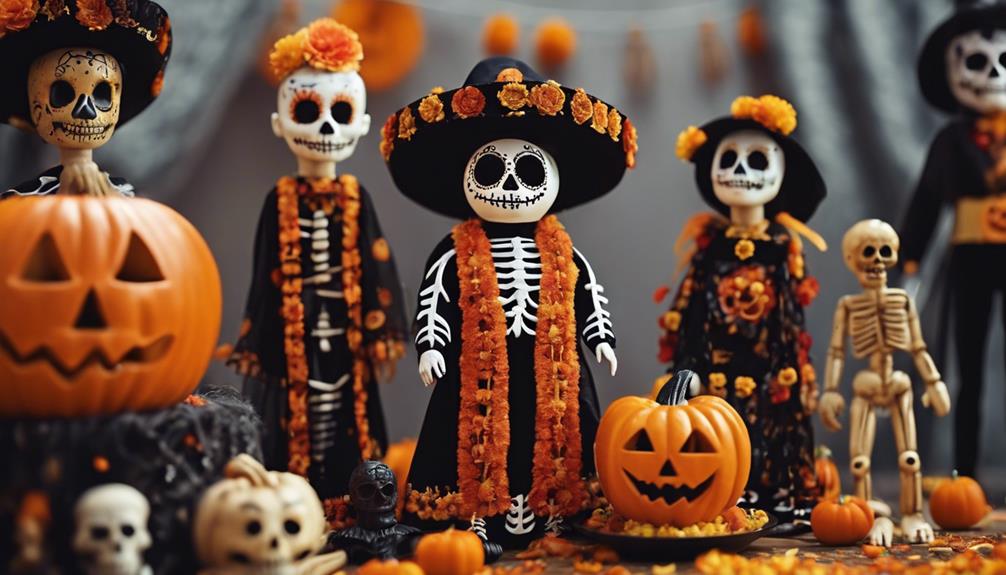
Exploring the varied customs and practices surrounding Halloween across different countries reveals a rich tapestry of diverse celebrations worldwide. Understanding the global Halloween diversity showcases how varying levels of celebration and cultural contexts influence regional differences in Halloween celebrations.
| Country | Diverse Cultural Practices |
|---|---|
| Mexico | Embraces traditions like Dia de los Muertos, honoring deceased loved ones. |
| Europe | Celebrates with events like Samhain in Ireland or All Saints' Day in Spain. |
| Asian Countries | May prioritize other cultural events over Halloween or have unique celebrations. |
| Global Perspective | Highlights the different ways Halloween is observed worldwide. |
From Mexico's vibrant Day of the Dead festivities to the European customs of Samhain and All Saints' Day, each region adds its own flair to Halloween celebrations. In contrast, Asian countries may have varying levels of participation or focus on different cultural traditions during this time. Acknowledging these diverse cultural practices enriches our appreciation for the global tapestry of Halloween festivities.
Frequently Asked Questions
Does Everyone in the World Celebrate Halloween?
Not everyone in the world celebrates Halloween. Different cultures have their unique traditions and holidays during this time. While countries like Mexico, Ireland, and the United States have strong Halloween customs, not all nations observe this holiday.
Some have similar celebrations around the same period, like Día de los Muertos in Mexico and Guy Fawkes Day in England. The popularity of Halloween varies globally, with some regions embracing it more than others.
Which Countries Do Not Celebrate Halloween?
In countries like China, Japan, and South Korea, Halloween isn't traditionally celebrated. Some regions in Asia are starting to embrace Halloween customs due to globalization.
Cultural and religious differences can influence the lack of widespread Halloween celebrations in certain countries. Generally, Halloween is more popular in Western countries compared to those with distinct cultural practices.
Do All Countries Trick or Treat?
In many countries, trick-or-treating isn't a universal Halloween tradition. Customs vary globally, with some regions opting for different celebrations instead.
While countries like the United States and Canada embrace trick-or-treating, others have their own unique ways of marking the holiday. So, not all countries partake in this specific aspect of Halloween festivities.
It's fascinating to see the diverse cultural practices that make each country's celebrations special.
In Which Country Halloween Is Celebrated the Most?
In the United States, Halloween is celebrated the most, with a multitude of traditions like trick-or-treating, pumpkin carving, and haunted houses. It's a highly popular holiday marked by elaborate decorations, costume parties, and community events.
American culture has embraced Halloween, with around 179 million Americans planning to join in the festivities each year. The U.S. leads in Halloween celebrations, hosting events like large parades in cities and neighborhood gatherings.
Conclusion
To wrap up, Halloween is celebrated in different ways around the world, with cultural variations and unique customs in various countries.
While some regions embrace the spooky festivities with open arms, others may not even recognize the holiday.
Remember, when it comes to Halloween celebrations globally, it's truly a case of different strokes for different folks.
Hi, I’m Absinthe. I help manage Halloween Product Reviews, the only website you’ll need for all your Halloween essentials. My favorite holiday is, undoubtedly, Halloween. I thrive on the spooky atmosphere, the creative costumes, and yes—the candy! I am always on the lookout for new and exciting ways to celebrate and share my discoveries to enhance your Halloween experience. Make sure to visit us, and I promise you’ll find something to make your Halloween unforgettable!
Halloween
How Does Denmark Celebrate Halloween Traditions?
Discover how Denmark blends international Halloween customs with local folklore in a unique celebration that combines spooky traditions with a cozy Danish twist.
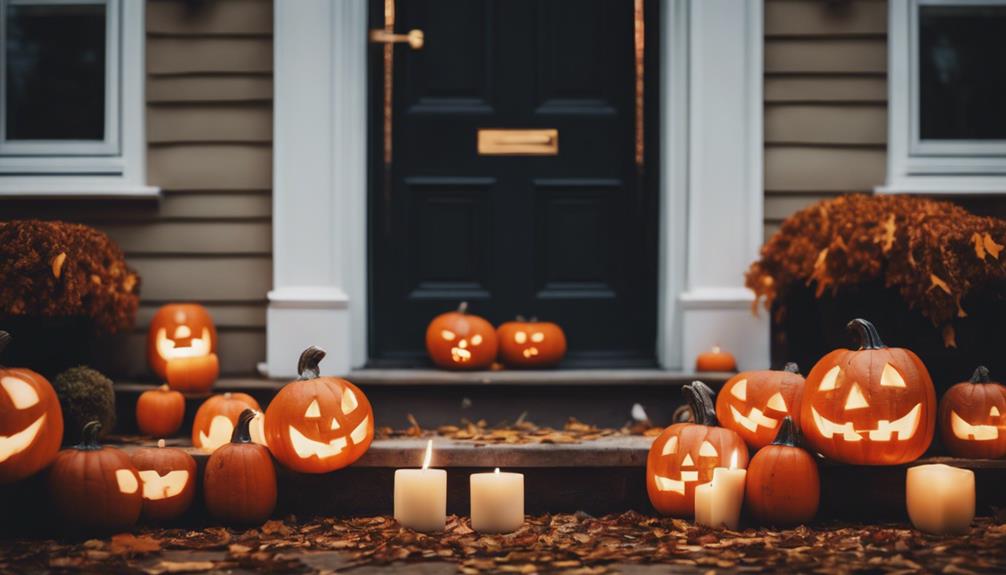
In Denmark, Halloween traditions mix international customs with local folklore and the cozy hygge concept. Danish celebrations include dressing up, enjoying Danish pastries, and joining in trick-or-treating, blending spooky decorations with a touch of Danish mythology. You'll notice a fusion of traditional and modern elements, influenced by American culture through Hollywood and TV. Urban areas host elaborate events, while rural communities focus on local traditions. Unique to Denmark are games like 'Slå katten af tønden' and festive treats such as Harvest Kringle and Danish Dream Cake. As you explore further, you'll uncover a rich tapestry of customs reflecting Danish creativity and heritage.
Key Takeaways
- Danish Halloween blends local folklore with international influences.
- Traditional Danish pastries and hygge ambiance are emphasized.
- Trick-or-treating is a common activity in urban areas.
- American culture influence has shaped modern Danish Halloween celebrations.
- Social media and international schools promote Halloween events in Denmark.
Danish Halloween Traditions
Curious about how Denmark celebrates Halloween traditions? Danish Halloween traditions are a unique blend of international influences and local folklore. In Denmark, Halloween has taken on a special twist by incorporating elements of Danish mythology. Instead of the typical witches and vampires, you might see revelers dressed up as trolls and elves, adding a touch of Danish culture to the celebrations.
Danish Halloween festivities also include the concept of hygge, creating a cozy and welcoming atmosphere for gatherings. As part of the celebrations, traditional Danish pastries are often enjoyed alongside spooky decorations and costumes. Children in larger cities join in on the fun by going trick-or-treating, receiving a mix of candies and tangerines.
Moreover, Danish Halloween traditions often integrate folklore creatures like the nisse, adding a touch of local charm to the spooky festivities. So, if you find yourself in Denmark during Halloween, be prepared for a unique and enchanting celebration that combines international Halloween traditions with a Danish twist.
Influence of American Culture
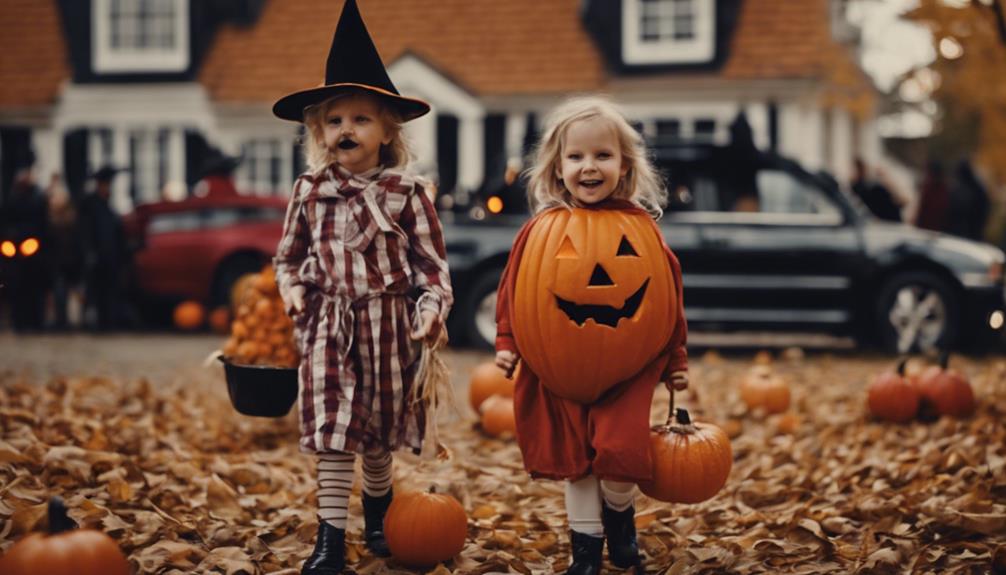
American culture has greatly influenced how Halloween is celebrated in Denmark. Hollywood movies and TV shows played a crucial role in introducing American Halloween traditions to Denmark in the late 1990s and early 2000s.
Today, Danish Halloween festivities showcase a fusion of American customs like trick-or-treating with local folklore, creating a unique and culturally rich celebration.
American Halloween Influence
You can see the impact of American Halloween traditions on Denmark's celebrations, particularly in the early 2000s when new customs like trick-or-treating and spooky decorations began to influence Danish Halloween practices. American pop culture, movies, and TV shows played a significant role in familiarizing Danish youth with Halloween traditions.
The introduction of American customs like trick-or-treating and spooky decorations added a new dimension to Halloween in Denmark. Danish Halloween now includes elements like dressing up in costumes and sharing candies, inspired by American practices.
The adaptation of American Halloween customs in Denmark showcases a blend of global influences with local Danish traditions.
- American Halloween traditions influenced Danish Halloween celebrations in the early 2000s.
- The introduction of American customs like trick-or-treating and spooky decorations added a new dimension to Halloween in Denmark.
- Danish Halloween now includes elements like dressing up in costumes and sharing candies, inspired by American practices.
- American pop culture, movies, and TV shows played a significant role in familiarizing Danish youth with Halloween traditions.
- The adaptation of American Halloween customs in Denmark showcases a blend of global influences with local Danish traditions.
Cultural Adaptations
Embracing elements of American culture, Danish Halloween celebrations have evolved with a unique blend of traditional folklore and contemporary customs. Since its introduction in the early 2000s, Halloween in Denmark has been influenced by American traditions, giving rise to a fascinating mix of old and new practices.
The incorporation of spooky decorations, costumes, and the popular activity of trick-or-treating reflects the impact of American Halloween customs on Danish society. Importantly, social media and international schools have played a pivotal role in promoting Halloween events, facilitating a cultural exchange between Denmark and the U.S.
This cultural adaptation is evident in the fusion of ancient Samhain rituals with modern Halloween festivities in Denmark, showcasing an engaging intersection of cultural traditions. As Danish Halloween continues to evolve, it maintains a distinct character that honors both its roots in Danish folklore and the influence of American Halloween celebrations.
Fastelavn Vs. Halloween Celebrations
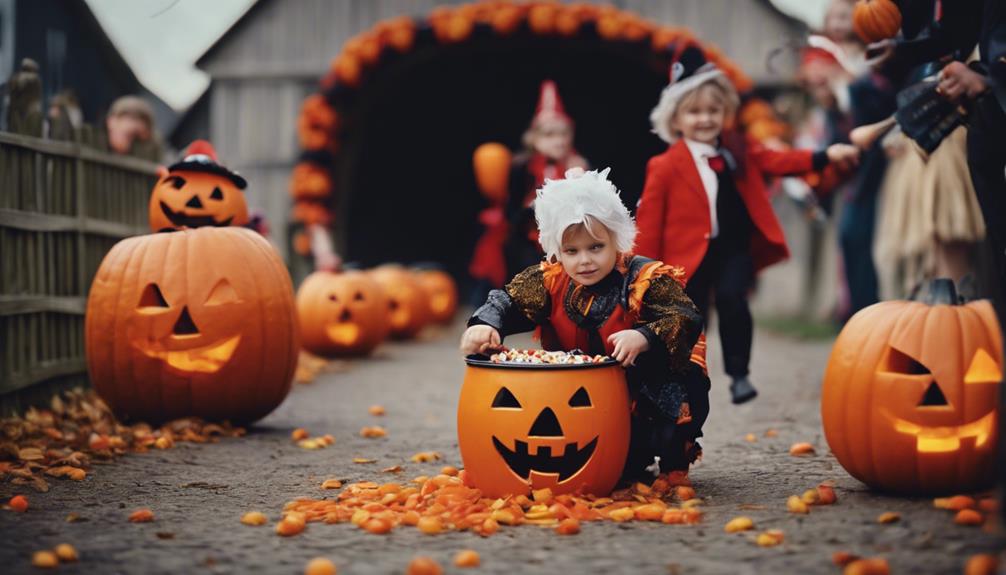
When comparing Fastelavn and Halloween celebrations in Denmark, you'll notice distinct differences in cultural costumes and festive treat traditions. Fastelavn embraces its roots with unique customs like hitting a barrel for sweets and crowning a 'kattekonge,' while Halloween showcases a blend of modern and traditional influences in its costume choices and spooky treats.
Both celebrations offer a fun and engaging way for Danes to enjoy dressing up and indulging in delicious treats, each with its own charm and allure.
Cultural Costume Contrasts
In Denmark, the contrast between Fastelavn and Halloween costumes highlights the fusion of international and local cultural influences in festive attire. Fastelavn traditions involve dressing up in costumes and hitting a barrel to release treats, similar to Halloween customs. When it comes to Halloween costumes in Denmark, you may see a mix of traditional Danish creatures like trolls and elves, adding a unique local flavor to the celebrations. Fastelavn celebrates Danish cultural heritage through its costume traditions, while Halloween in Denmark showcases a blend of international and local costume styles, creating a vibrant display of cultural diversity.
Both Fastelavn and Halloween celebrations in Denmark emphasize the importance of thematic attire, reflecting the diverse cultural influences that shape the country's festive traditions.
- Fusion of international and local cultural influences
- Unique mix of traditional Danish creatures in Halloween costumes
- Celebration of Danish cultural heritage through Fastelavn costumes
- Blend of international and local costume styles in Halloween celebrations
- Emphasis on thematic attire in both Fastelavn and Halloween festivities
Festive Treat Traditions
The festive treat traditions during Fastelavn and Halloween celebrations in Denmark showcase a delightful blend of cultural customs and sweet indulgences.
Fastelavn, celebrated on the night before Ash Wednesday, involves children dressing up in costumes and going door-to-door for treats, reminiscent of Halloween traditions. One of the highlights of Fastelavn is the 'Slå katten af tønden' game, where participants take turns hitting a barrel until it breaks open, releasing candies and treats for everyone, similar to the concept of trick-or-treating.
Traditional Danish Fastelavnsboller, sweet buns filled with cream or jam, are a popular treat enjoyed during the Fastelavn festival. The atmosphere during Fastelavn is marked by community gatherings, games, and a joyous spirit. Many Danes appreciate Fastelavn for its deep-rooted religious and pagan connections to Danish tradition, making it a cherished celebration that some prefer over Halloween.
Urban Vs. Rural Celebrations
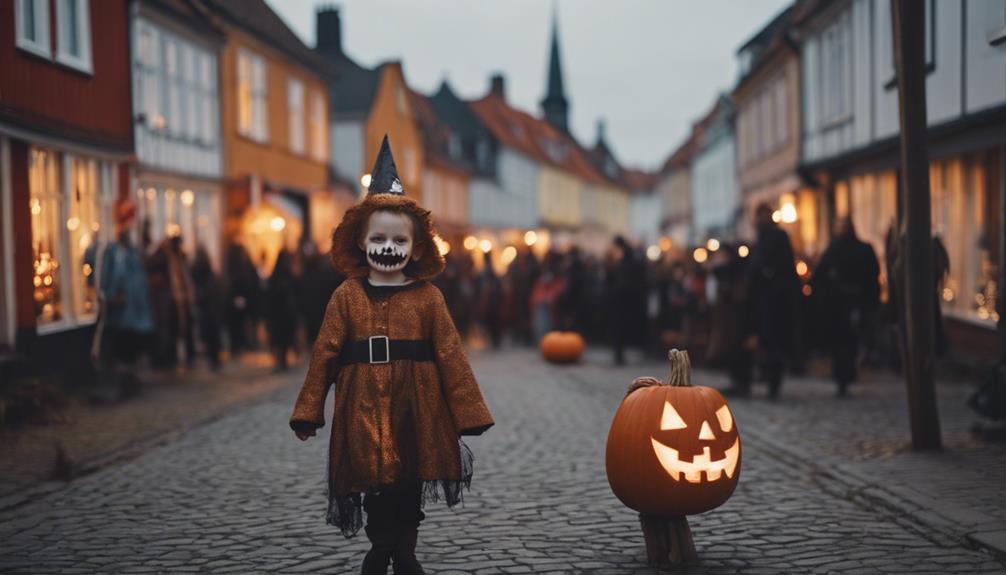
Urban streets in Denmark come alive with elaborate Halloween decorations and vibrant organized events, contrasting the more intimate and traditional celebrations found in rural communities. In the cities, children often take part in trick-or-treating by visiting stores and homes for treats, while rural areas see families putting their unique spin on Halloween with local traditions.
Here are some key differences between urban and rural Halloween celebrations in Denmark:
- Urban areas showcase elaborate Halloween decorations and organized events.
- Rural communities focus on local traditions and family gatherings.
- Trick-or-treating is common in larger cities, with children going door to door for treats.
- In rural areas, families organize Halloween parties with traditional Danish treats and games.
- Both urban and rural areas blend international customs with local traditions to embrace the spirit of Halloween.
Traditional Games and Customs
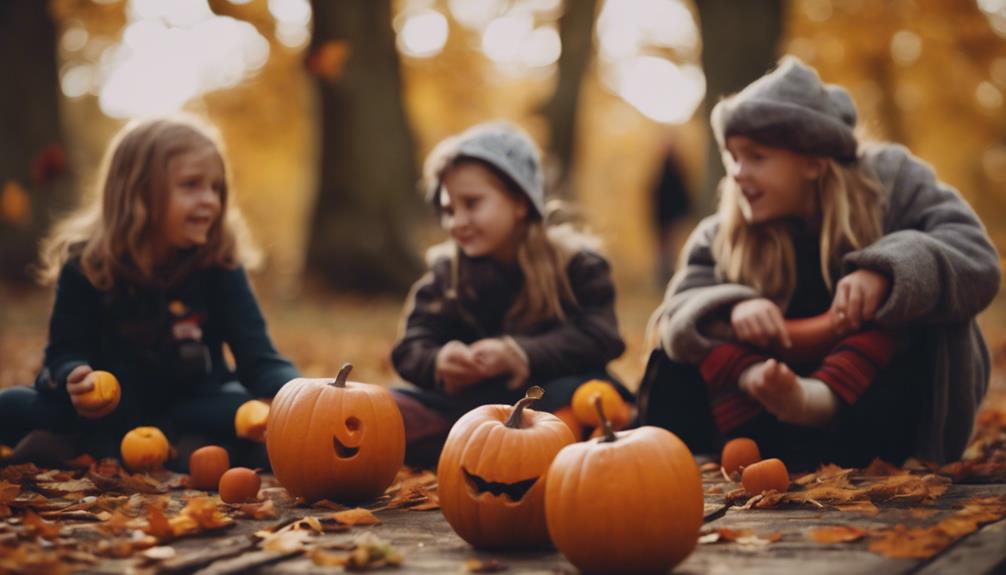
Explore the vibrant traditional games and customs that add excitement to Danish Halloween celebrations. One popular traditional game in Denmark during Halloween is 'Slå katten af tønden,' which translates to 'hit the cat out of the barrel.' This game is a staple during Fastelavn celebrations and involves hitting a barrel filled with candy until the treats spill out for children to enjoy. Participants take turns trying to break the barrel, and the lucky individual who succeeds is crowned the 'cat king.' This interactive game not only provides entertainment but also creates a festive atmosphere during Danish Halloween festivities.
| Traditional Games | Description |
|---|---|
| 'Slå katten af tønden' | Participants hit a candy-filled barrel to release treats, with the winner becoming the 'cat king.' |
| Fastelavn Celebrations | Festive events where traditional games like 'Slå katten af tønden' are enjoyed by both children and adults. |
| Denmark | Known for its rich cultural heritage reflected in the traditional games played during Halloween celebrations. |
Festive Treats and Sweets
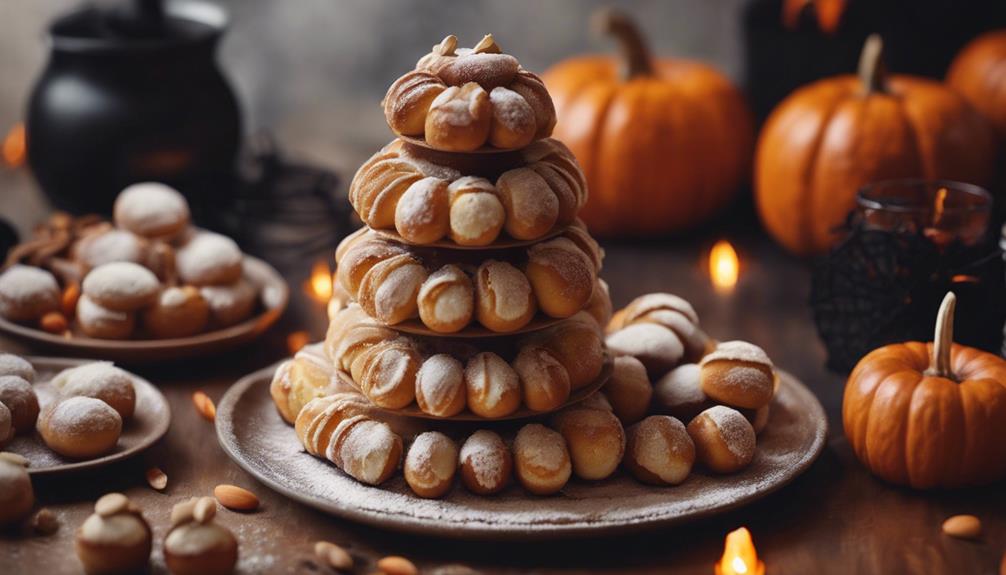
Exploring the vibrant Halloween traditions of Denmark, now let's uncover the delightful array of festive treats and sweets enjoyed during these spirited celebrations. Halloween in Denmark brings a mix of traditional flavors and innovative treats to the table. Here are some must-try festive treats:
- Harvest Kringle: Inspired by local apple orchards, this sweet pastry is a seasonal favorite.
- Maple Walnut Kringle: A popular choice, this treat combines the richness of maple syrup with the crunch of walnuts.
- Danish Cinnamon Apple Bread Pudding: Offering a warm and comforting fall dessert option, this dish is sure to please.
- Danish Dream Cake: Topped with coconut and brown sugar, this cake is a Halloween staple loved by many.
- Pumpkin Crown Cake: Drizzled with sweet icing and butter brown sugar glaze, this cake is a must-try for anyone celebrating Halloween in Denmark.
Indulge in these delightful treats to experience the unique flavors of Halloween in Denmark.
Decorations and Events
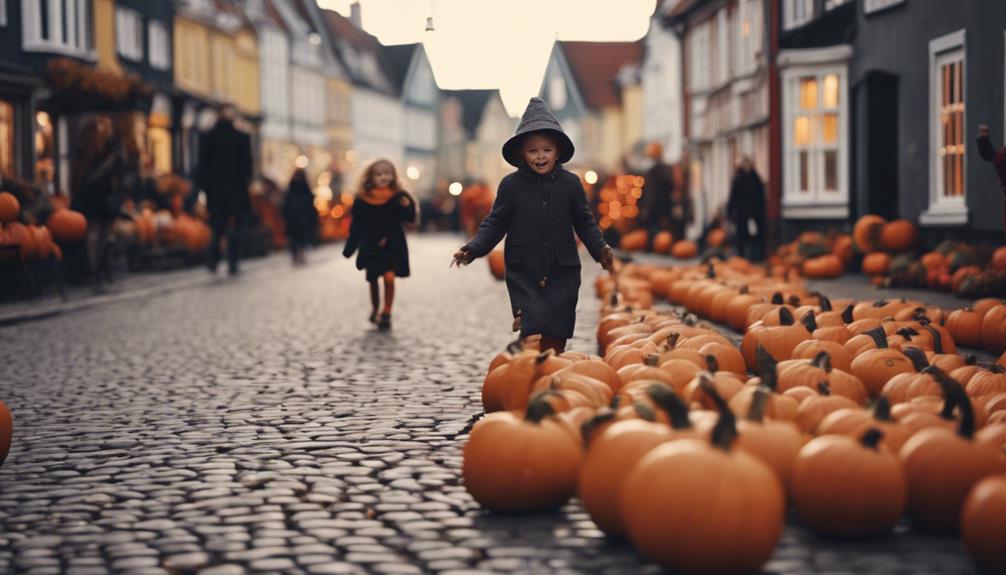
As Halloween approaches in Denmark, festive decorations and exciting events come to life across the country. The Halloween festivities in Denmark are marked by vibrant decorations and fun events for all ages. Tivoli Gardens in Copenhagen, for instance, transforms into a Halloween wonderland with themed rides and shows that cater to both children and adults. Market stalls within Tivoli also get into the spirit by adorning their spaces with spooky decorations and offering homemade sweets to visitors. Additionally, pumpkin patches like Ventegodtgaard provide families with the opportunity to pick their own pumpkins for Halloween, adding to the festive atmosphere.
To further immerse in the Halloween spirit, farms throughout Denmark set up pumpkin patches and host various events for visitors to enjoy. When it comes to costumes, witches and ghosts are popular choices among Danes, with trick-or-treating activities mostly concentrated in larger cities. The combination of creative decorations, engaging events, and unique costumes makes Halloween in Denmark a memorable and exciting celebration for all.
| Decorations | Events |
|---|---|
| Themed rides and shows at Tivoli Gardens | Pumpkin patches with harvest activities |
| Market stalls with Halloween decorations and sweets | Farms hosting Halloween festivities |
Cultural Significance and Evolution
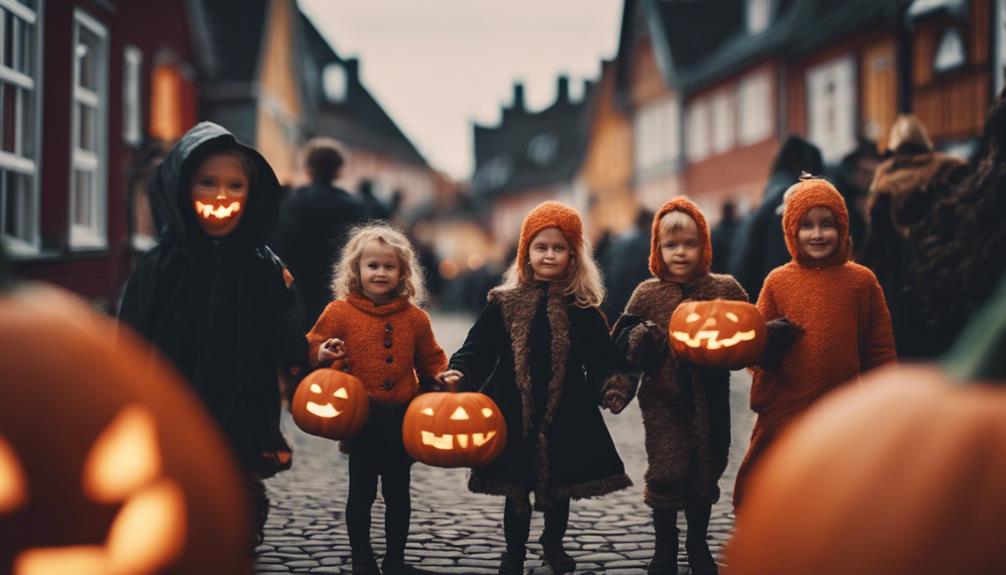
The evolution of Halloween in Denmark from a niche event to a nationwide celebration reflects a dynamic fusion of Celtic traditions, Christian rituals, and local folklore. Globalization, social media, and educational institutions have played key roles in the spread and adoption of Halloween in Denmark.
Danish adaptations of Halloween embrace elements of local folklore and mythology, creatively blending international and local traditions. Community engagement and cultural exchange have helped make Halloween a beloved tradition in Denmark, with a unique local twist.
The incorporation of the hygge concept, traditional Danish pastries, and folklore like nisse showcase Denmark's unique take on Halloween celebrations. The rich history of the Celtic festival of Samhain, intertwined with modern Halloween traditions, adds depth and significance to the way Danes celebrate this festive occasion.
Frequently Asked Questions
How Do People in Denmark Celebrate Halloween?
When in Denmark, Halloween is a lively affair. People across the country embrace the spooky spirit by donning costumes, carving pumpkins, and enjoying traditional Danish sweets.
In larger cities, trick-or-treating is a common sight. Tivoli Gardens in Copenhagen goes all out, morphing into a frightful wonderland with themed rides and shows.
Danish Halloween celebrations cleverly blend ancient customs with modern practices, resulting in a unique and festive atmosphere for all to enjoy.
What Is the Danish Version of Halloween?
In Denmark, the Danish version of Halloween blends international and local traditions, creating a unique celebration. Danes embrace elements of American Halloween while also incorporating Danish folklore and mythology.
Some choose to dress up as traditional Danish creatures like trolls and elves, adding a local touch to the festivities. This fusion of old and new traditions makes Halloween in Denmark truly special and resonates with the local population, enriching the holiday experience.
Is Halloween a Holiday in Denmark?
Halloween isn't a public holiday in Denmark. While it's not an official Danish holiday, Halloween has become quite popular in the country. Many communities in Denmark have embraced this festive celebration influenced by American customs.
Schools and towns often host Halloween-themed events for everyone to enjoy. In some urban areas, you might find spooky decorations, costume parties, and even trick-or-treating activities during Halloween.
What Are the Traditions of Denmark?
In Denmark, traditions such as Midsummer's Eve bonfires and St. Lucia's Day processions honor cultural heritage. Danish Christmas festivities include dancing around the Christmas tree and enjoying traditional dishes like Æbleskiver.
Easter is marked by decorating eggs and enjoying smørrebrød. Summer holidays often involve picnics and outdoor activities like sailing. Danish traditions blend history and modern customs, creating a rich tapestry of celebrations throughout the year.
Conclusion
To sum up, Denmark celebrates Halloween traditions with a mix of American influence and traditional customs.
Whether in urban or rural areas, Danes enjoy festive treats, games, and decorations during this spooky time of year.
Despite the evolving cultural significance, the spirit of Halloween remains strong in Denmark.
As the saying goes, 'when in Rome, do as the Romans do,' and in Denmark, that means embracing the Halloween spirit with open arms.
Hi, I’m Absinthe. I help manage Halloween Product Reviews, the only website you’ll need for all your Halloween essentials. My favorite holiday is, undoubtedly, Halloween. I thrive on the spooky atmosphere, the creative costumes, and yes—the candy! I am always on the lookout for new and exciting ways to celebrate and share my discoveries to enhance your Halloween experience. Make sure to visit us, and I promise you’ll find something to make your Halloween unforgettable!
-

 Halloween1 month ago
Halloween1 month agoMga Tauhan ng Florante at Laura Costume
-

 Halloween1 month ago
Halloween1 month agoSexy Harry Potter Outfits For Halloween
-

 Halloween1 month ago
Halloween1 month agoA Child in a Hitler Costume Causes a Stir Online
-

 Halloween2 months ago
Halloween2 months agoCan You Go to Halloween Horror Nights While Pregnant?
-

 Halloween1 month ago
Halloween1 month agoAlvin and the Chipmunks Costume Ideas
-
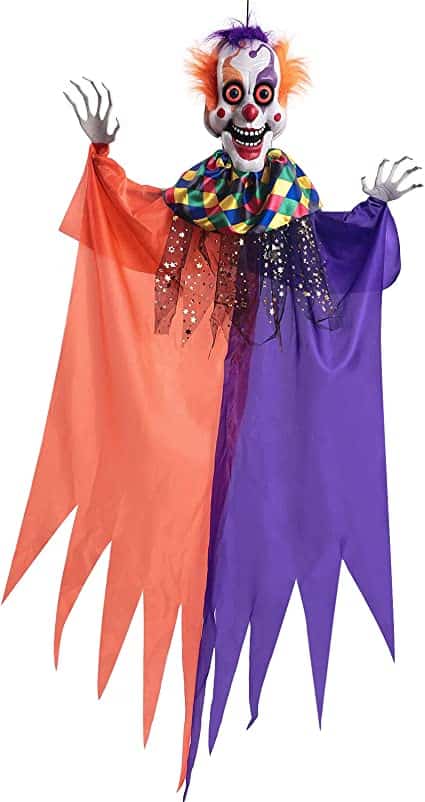
 Halloween1 month ago
Halloween1 month agoHow to Protect Halloween Animatronics From Rain
-

 Halloween1 month ago
Halloween1 month agoHow to Get Halloween Cookies in Cookie Clicker
-

 Halloween1 month ago
Halloween1 month agoWinx Club Costume For Adults


